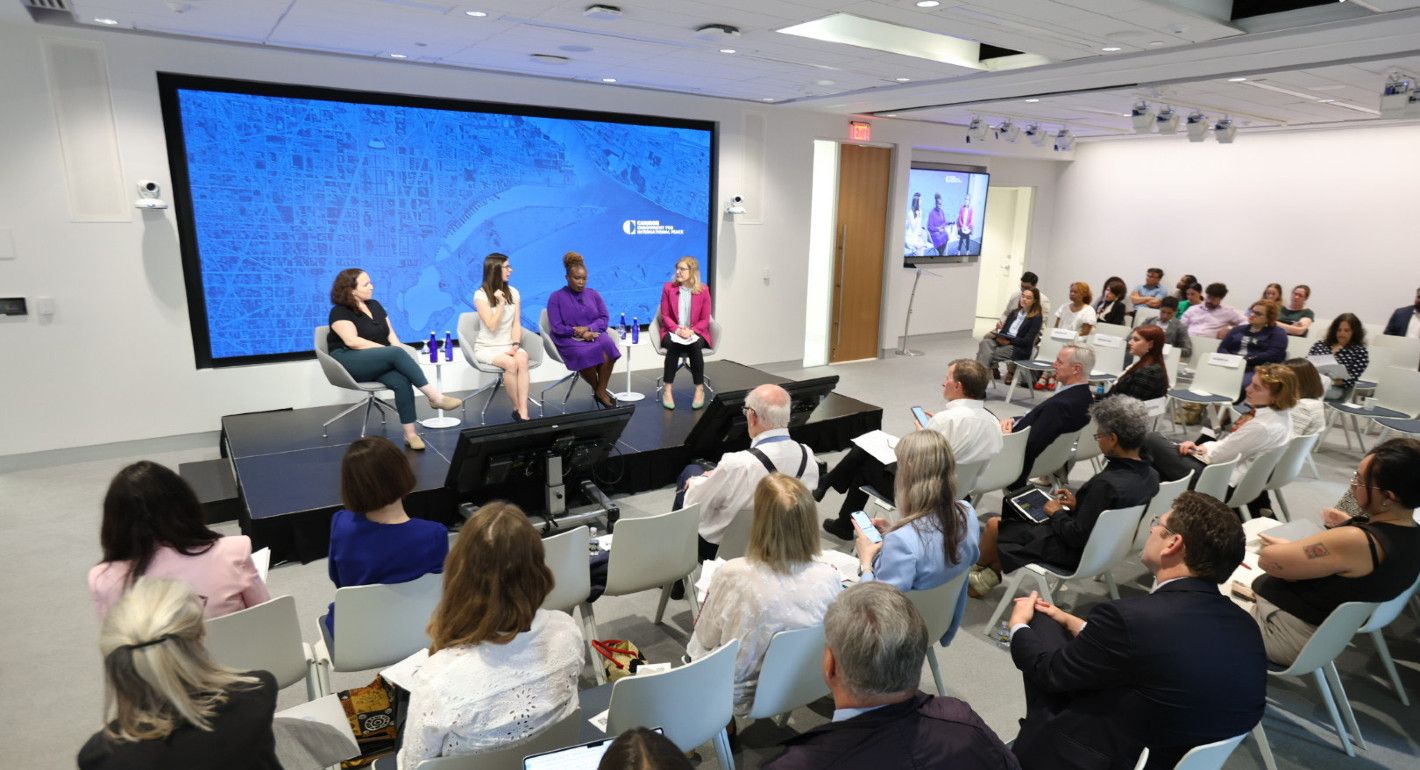{
"authors": [
"Lisa Poggiali"
],
"type": "commentary",
"centerAffiliationAll": "",
"centers": [
"Carnegie Endowment for International Peace"
],
"englishNewsletterAll": "",
"nonEnglishNewsletterAll": "",
"primaryCenter": "Carnegie Endowment for International Peace",
"programAffiliation": "",
"programs": [],
"projects": [],
"regions": [],
"topics": []
}
The AI AGE launch event at the Carnegie Endowment in Washington on June 12, 2025. (Photo by Will Martinez for IFES)
Solidarity, Not Speed, for AI Governance
Although speed is wielded as a weapon to bypass accountability mechanisms and consolidate power, strategic slowness is a tool democrats can leverage to ensure consultation and inclusion.
On June 12, 2025, the International Foundation for Electoral Systems (IFES) launched the Artificial Intelligence Advisory Group on Elections (AI AGE) at the Carnegie Endowment for International Peace in Washington, D.C. AI AGE is a first-of-its-kind initiative that brings together electoral authorities—essential guardians of democracy—from around the world and some of the world’s foremost AI experts to jointly tackle the challenges that AI poses to democracy and to imagine new possibilities for its use. Founding electoral management bodies in the initiative include Argentina, Indonesia, Kenya, Taiwan, and Ukraine.
AI AGE convenes some of the most innovative thinkers working to ensure that AI strengthens rather than subverts democracy, including Katie Shay, who founded Cisco’s responsible AI program; Audrey Tang, Taiwan’s first digital minister, who championed a decentralized approach to digital identification; and Sujata Mukherjee, who built a trust-and-safety research consortium across global majority countries. AI AGE is grounded in the belief that to ensure AI’s benefits are distributed equitably, we need not act faster —as those chasing the dream of artificial general intelligence would have us believe—but rather more strategically.
Invalid video URL
The stakes are high. In May 2025, President Donald Trump embarked on a diplomatic tour of the Gulf with an entourage of tech billionaires, defense contractors, and financiers. Over sword dances and lavish state dinners, they struck a series of landmark deals: a massive AI data center in the UAE backed by OpenAI and a constellation of Silicon Valley firms, and over $23 billion in investments pledged between Saudi Arabia’s new AI giant HUMAIN and U.S.-based tech companies.
The visit showcased the Gulf states’ vision of AI as the cornerstone of a post-oil economy. It also revealed a deeper shift in global power dynamics: States are no longer simply contracting with tech companies but are elevating them as partners in governance. This is happening on both large and small scales.
Take an example from another region: In April of this year, the Brazilian government and Silicon Valley–based private sector partner DrumWave launched dWallet, a digital wallet that enables citizens to monetize their personal data by trading it with companies for profit. The first initiative of its kind, dWallet is billed as an effort to empower regular people to take ownership over the private information that tech companies and their data brokers often access for free. In so doing, however, dWallet has also transformed a fundamental human right—privacy—into a commodity that can be auctioned off to the highest bidder. Brazil currently has one of the strongest data protection regimes in the world, having enacted the Brazilian General Data Protection Law in 2020 and amended its constitution to include data protection as a fundamental right in 2022. Now, a bill is under deliberation in Brazil’s National Congress that proposes to amend that regime so that its guiding principle is not protection, but monetization. Such an example raises questions about how emerging public-private partnerships will shape the future governance of AI, the data that feed its models, and the rights and freedoms of everyday citizens who generate those data.
Industry leaders, technologists, and policymakers failed to create a democratic model for governing social media, and we have been playing catch-up, unsuccessfully, since its invention. As AI extends into more and more domains of public life, the world now risks repeating this failure. But this does not mean we should adopt the “move fast and break things” ethos that has been embraced by tech companies and authoritarians alike.
AI AGE advocates for a different temporality: that of dialogue, deliberation, and debate. This is the tempo of democracy. While speed is wielded as a weapon to bypass accountability mechanisms and consolidate power, strategic slowness is a tool democrats can leverage to ensure consultation and inclusion. These are not bugs but essential features of democratic governance.
The early internet embodied the kind of democratic ethos we can look to today for guidance. Deliberation between companies such as Netscape, the U.S. government, and technologists such as Tim Berners-Lee gave rise to the World Wide Web Consortium (W3C), which developed open web standards grounded in freedom of expression, multi-stakeholder engagement, and access to information. While far from a perfect model, the W3C is one of the reasons we still have a global, open internet today.
Elections officials, technologists, human rights advocates, democratic governments, and many other stakeholders from all over the world have a central role to play in setting global standards and norms for the governance of AI. As cyber ambassador and AI AGE member Audrey Tang put it during remarks at the AI AGE launch, “A vertical, zero-sum race toward a technological singularity leaves everyone behind. But with a horizontal, grassroots movement of plurality, technology becomes a win-win ally.”
In an age of rapid technological change and accelerating autocracy, real innovation lies not in speed but in solidarity. The future can be changed—but only if we remember that democracy, like artificial general intelligence, is not inevitable.
About the Author

Lisa Poggiali
Global Digital Democracy Advisor, International Foundation for Electoral Systems (IFES)
Lisa Poggiali is an anthropologist and tech policy expert with 15+ years of experience working at the intersection of technology, democracy and geopolitics. She is the Global Digital Democracy Advisor at IFES, and former Senior Advisor at USAID. Her efforts have empowered governments, civil society and industry across five continents to address emerging issues surrounding digitalization, and to develop and harness technologies that strengthen democratic resilience and respect for human rights. Lisa holds a Ph.D. from Stanford.
Carnegie does not take institutional positions on public policy issues; the views represented herein are those of the author(s) and do not necessarily reflect the views of Carnegie, its staff, or its trustees.